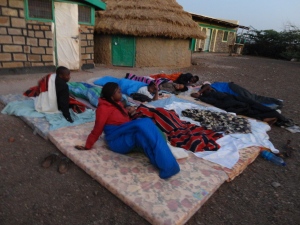The Journey to Kakuma
You’ll always miss 100% of the shots you don’t take. ~Wayne Gretzky
It is a hard task to convince man to forfeit celebrations and times with family and join you in a desert. It is even worse if you know not where it is you are going: how it looks like, which way to take, how the food is like and the people, et al. But we set out, an amazing team of ten, to explore that part of the nation where the concept of holiday is as foreign as aliens are on earth 🙂 I digress.
December 27 2011– Departure-from-Nairobi day. It rained heavily that morning, so much so that some arrived very early and others were a whole two hours late. But we set out all the same and albeit the morning hiccups, got to Kitale an hour before dusk. I especially cherish the stop we made at Kenya Cooperative Creameries(KCC) in Eldoret, where we were given as much cartons of whole milk as we could carry. We did not know it then, but the village we visited in Kakuma had so many children and milk was just the perfect drink to share with them. Every child had enough (about 3 packets) and there was lots left to give to the parents as well 🙂 That evening was spent giving thanks, dining, bonding and resting. I doubt if anyone managed to watch Courageous the Movie in its entirety though. That is how tired we were.
December 28, 2011– After breakfast and time in prayer, we had to sort out all the clothes and shoes that had been donated. we had four bags marked Boys, Girls, Women and Men. While at it, we realized there were specifics that could not be worn in Kakuma. These, we put in a fifth bag. We purposed that those ones would go to The Esther Home: a home in Kitale that houses teenage mothers that have been chased away from home for getting children out of wedlock. At Esther Home, they are taught life skills like tailoring and tutored so they can sit for their KCPE exams then join high schools after that. 🙂
There are two bus companies that leave Kitale for Kakuma everyday: Eldoret Express and Dayah Express. The former is more expensive and more comfortable, in the opinion of most that we asked. We thus opted for it. In Nairobi, it would be equated to being aboard the big (and older) buses that have three seats on one side and two seats on the other and which serve different routes in the city. Our bus left at 11am, full of people and laden with luggage. From an hour into the journey, the bus stopped everywhere there were people by the road to carry them and all their luggage (it was a lot every time!). No one was left behind. We were sitted at the front and could hear how much they were being charged. At all times, the extra passengers had to part with a thousand shillings or more for gracing the bus with their presence and if they had luggage, that was charged separately- and exorbitantly. “They have money,” the conductor said in a dialect I understood. So they put their luggage in the aisle and sat on it the whole way. In a funny incident, a woman actually sat on one of the team member’s lap. The language barrier just made it funnier for us as he tried to find out what was going on and politely ask her to sit elsewhere. She eventually sat on her luggage, but seemed quite unhappy!
Our first main stop was at Lokichar. Very hot town that stands in the middle of desert-like land, full of mini sand-storms but a flourishing town no less. We had been advised to eat fried or roast meat in one of the hotels and true to our advisor’s word, it did not disappoint and no one had tummy upsets 🙂 It is here that one of us was almost beaten up for taking photos of the town structures and of the little children nearby. An enraged man kept saying we should pay for taking photos which we will later sell and get rich. Anyway, the conductor took even more passengers; only that this lot had very hostile characters. They had knives in pouches and small rungus and stools on their hands (which is normal I hear) but were very rude to the conductor and to other passengers as well. Long story short, they alighted at Lodwar two hours later and we carried only their memory with us beyond that point. Lodwar is a busy (and seemingly big) town. It is here that you either branch to Lake Turkana or take the road to Kakuma.
We finally got to Kakuma in the dead of night and had a momentary scare when the conductor refuse to unload any of our luggage saying it was very late in the night and he was not authorized to do so. But we had great mediators in the team and empathetic friends we had made while travelling in the bus. At everyone’s request, all our luggage was offloaded. Thank God! I try not to wonder what would have happened otherwise. So we found our way to the compound in which we would be sleeping and carried all our luggage from the road into the house, taking turns to watch over the roadside luggage with flash lights and carry the rest to the house until it was all in.
And just like that, like campers at the Mara or closer home, like most other people in Kakuma, we got ten mattresses from the house, put them on the dusty ground outside, prayed, sang, recounted stories and slept- right under the stars. 🙂

sleeping outside was quite an experience for us. More importantly, it is a way of life for the people in Kakuma.

